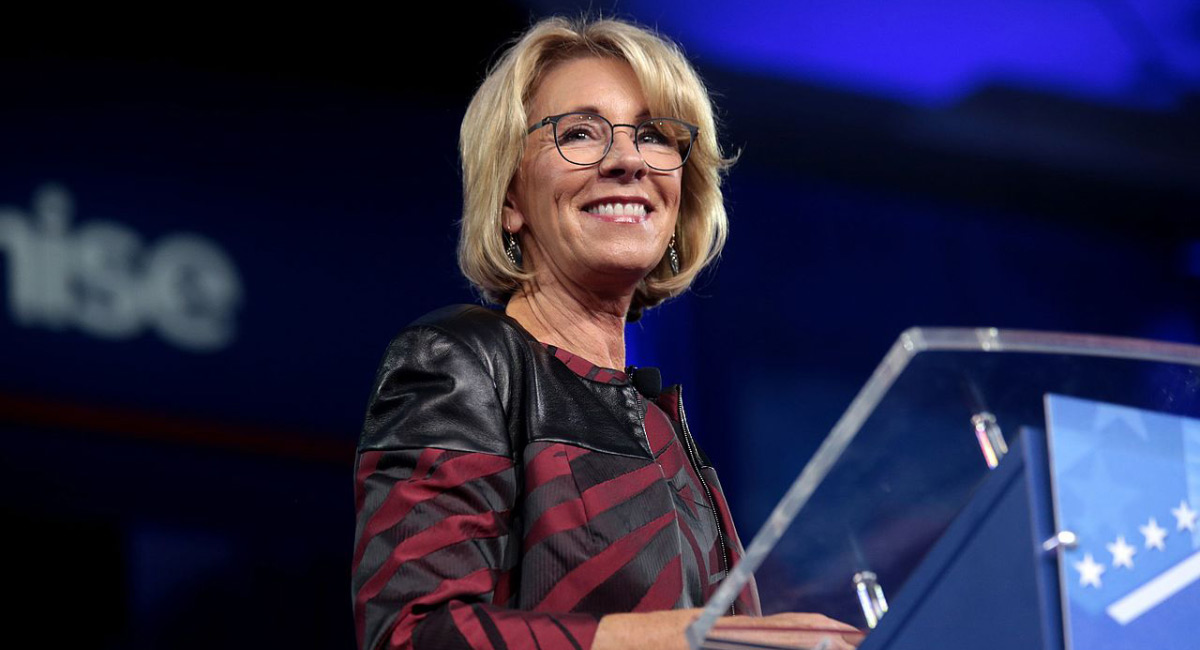I have said umpteen times that I think the net contribution of the U.S. Department of Education to American collegiate life is negative—the average productivity of employees of that Department dealing with higher education issues is less than zero. The problem, however, is far less with the employees, many of whom are good people, than with the mission. In early 2017, newly elected president Donald Trump had an awful time even getting his Education Secretary nominee, Betsy DeVos, confirmed by the Senate: the vote was 50 to 50 (two Republican Senators voted against her)—with Vice President Mike Pence breaking the tie to confirm her, a first time in American history a vice president actually voted on a presidential nominee in the Senate.
On taking office, DeVos was already known as a strong advocate of charter schools and other deviations from the standard public school model, earning her the undying enmity of teachers unions. But she was not known for having any substantial connections to higher education, actually fairly typical, including President-Elect Biden’s nominee for Education Secretary, Miguel Cardona. However, she had a strong higher education aide in Diane Auer Jones, Principal Deputy Under Secretary, herself no shrinking violet with a somewhat controversial history, including years working in the for-profit higher education sector, which to some education policymakers is less honorable than, say, running a strip club or illicitly selling pot, an unfair perspective on the many good folks in that sector of higher education.
Yet I think Secretary DeVos has done a pretty good job, far better than her predecessor. I have known several education secretaries personally, some (e.g. Bill Bennett and Margaret Spellings) rather well. Mrs. DeVos is worthy company to them. Secretary DeVos in higher education will appropriately be best known for rolling back regulatory excesses of the Obama era, most notably the horrible 2011 “dear colleague” letter that pressured colleges and universities to address complaints of sexual harassment extremely aggressively, including denying basic due process protections to the accused in college judicial proceedings that have long been required in standard judicial trials within the U.S.
The current DeVos approved rules are far more reasonable. Some basic safeguards for those accused of wrongdoing, including the right to question one’s accusers and have one’s own witnesses, seem assured under the current regulations. There are some areas of legitimate controversy, for example, should college jurisdiction extend to off campus sites and incidences? My view is that where felonies are alleged as in the case of rape or sexual assault, matters should be adjudicated in courts of law first—college students should be treated the same as other citizens.
Secretary DeVos has tried to put some rationality into the federal student loan program, but that disastrous program is largely legislatively determined. Accreditation is another area of weakness, and again the Education Department is constrained considerably by laws imposed by Congress and the President. Two areas where some real improvement has occurred: students can access better information on college performance levels, and Congress finally has shortened the FAFSA (Free Application for Federal Student Assistance) form. On the whole, however, we did not see transformative reform or radical reduction in the administrative morass at the Department of Education.
Secretary DeVos, however, is leaving office with some good advice. She urges Congress to “reject misguided calls to make college ‘free’ and require the two-thirds of Americans who didn’t take on student debt or who responsibly paid off their student loans to pay for the loans of those who have not done the same.” She points out that debt forgiveness is regressive—aiding primarily the relatively affluent. She also urged Congress not to revoke her changes in Title IX (sexual assault) rules.
The Biden Administration and Congress will ignore her. It occurs to me that perhaps feisty ex-Secretaries of Education—think Bill Bennett and Betsy DeVos—should lead an education reform effort, especially regarding higher education—a Center for Collegiate Reform (CCR) or a Higher Education Reform Initiative (HERI). More “moderate” ex-secretaries—think Lamar Alexander or Margaret Spellings—might join as well, but I rather like the outspoken Bennett and DeVos leading the charge. I might even become a soldier in their reformist army.













